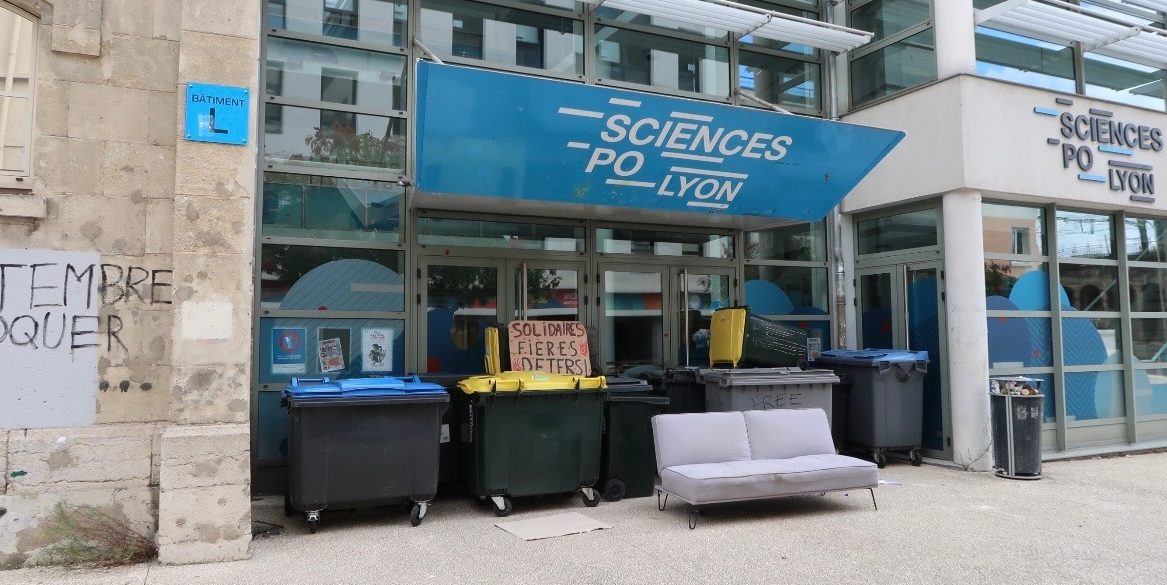Year abroad: A very French welcome
It’s a well-known stereotype that French people love to protest. Like all stereotypes, some national clichés ring truer than others (Parisians might not actually be as rude as we think). But after having had all but one of my classes cancelled in my first week studying at Sciences Po Lyon, this is one I’m inclined to agree with.
For international students starting at Sciences Po Lyon, it’s striking how politically engaged the students are here. The university is home to not just one but two student unions, as well as an eclectic mix of issue-based societies: from catcalling awareness to homelessness support, blood donation drives, and refugee language-teaching groups.
This strong political culture is visible throughout the campus. Many classrooms have red student union stickers stuck to whiteboards or under the desks. And, strange as it sounds, even the toilet graffiti reflects the political culture here: the doors are plastered with society stickers, news references, and slogans.
In one of the first international student orientation lectures, the mobility team stressed how central protesting is to student life, and warned that the first week’s teaching was likely to be disrupted because of an upcoming protest. On 10 September, students received an early email: “Due to blockade of the teaching building by students, no classes will be held today.”
Despite the grievances, the atmosphere was surprisingly convivial – and student enthusiasm remained high even under police control measures
That morning, some Sciences Po students had wheeled bins, placed signs, and even deposited a sofa across the entrance to the main teaching building before the first class. Anyone who hadn’t checked their emails before leaving the house would’ve wasted a trip to campus.
These student protesters were part of a wider national movement, Bloquons tout (Block everything). The catchphrase first emerged on French social media this year among the political right, but following a deeply unpopular mid-July budget it was claimed by a wider range of actors and grievances – including student unions, who said they would answer the call.
Many students also joined demonstrations called by the major trade unions. At the one I attended, around 3,000 people gathered to protest issues like youth insecurity, health service cuts, and higher taxes for the super-rich. Though, as one classmate summarised for me, most were: “generally, against Macron.” (The French President, who recently appointed his fifth Prime Minister in two years, has seen his popularity sink to an all-time low.)
The crowd included families with small children and vendors selling canned drinks and hotdogs. Despite the grievances, the atmosphere was surprisingly convivial – and student enthusiasm remained high even under police control measures.
To the other Warwick students starting a year abroad, I wonder if you’ve had any stereotypes about your host country confirmed or disproved – or maybe you’ve gained a fresh perspective on them in the process
Trying to avoid a column of protesters, who had been teargassed after leaving the official assembly point, I was ushered into a delicatessen by a staff member. A few students were already inside, coughing and rinsing their eyes with saline solution.
The lone Frenchman enjoying a coffee didn’t seem to mind that his midday drink had been disrupted. Though not protesting themselves, the staff told the group they could stay as long as they needed. When I asked the waitress if protests on this scale were typical in Lyon, she looked at me slightly strangely: “Of course.”
Eventually, we were let out of the shop’s back entrance, avoiding the chaos of the main street. The students repeated their thanks for the employees’ hospitality, and one shouted over their shoulder: “We’ll leave you a good review!” One of the waitresses replied: “Have a good protest!” The Bloquons tout and student protests have now mostly subsided – though they were followed by a larger national mobilisation on 18 September, which drew bigger crowds and more serious backlash.
To the other Warwick students starting a year abroad, I wonder if you’ve had any stereotypes about your host country confirmed or disproved – or maybe you’ve gained a fresh perspective on them in the process. And to those also beginning a year in France, I’ll leave you with the shopkeeper’s words when I admitted I was new here:
“Bienvenue en France!”

Comments